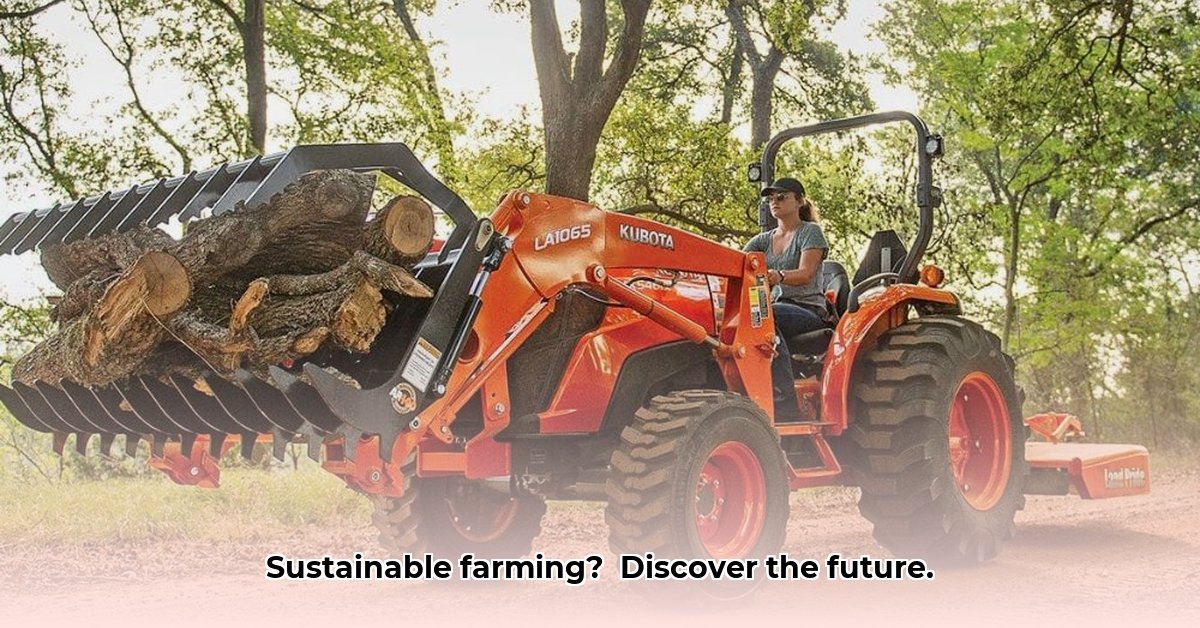
Sustainable agriculture is critical for the future of food production, and the equipment used plays a vital role. This case study examines Mid-Valley Tractor (MVT), analyzing its current operations, market position, and sustainability profile. We'll explore the challenges MVT faces and offer actionable recommendations for improving its sustainability performance and competitiveness within the burgeoning market for eco-friendly agricultural equipment. For examples of sustainable farming structures, see this useful resource on chicken coops.
MVT's Operations: A Diverse Portfolio for Sustainable Farming
MVT provides a broad range of agricultural and landscaping equipment from leading manufacturers such as Kubota, Polaris, Walker, and Landpride. Their portfolio includes tractors, ATVs, lawn mowers, and excavators, catering to a diverse customer base with varying needs. This breadth of offerings reflects the evolving landscape of sustainable agriculture, which demands both traditional effectiveness and environmentally conscious practices. However, the extent to which MVT's current offerings actively contribute to sustainability remains to be fully assessed.
Market Analysis: Navigating the Growing Demand for Sustainable Equipment
The market for sustainable agricultural equipment is experiencing significant growth, driven by increasing environmental awareness and the need for resource efficiency. Farmers are actively seeking solutions that minimize their environmental footprint without compromising productivity. This presents both opportunities and challenges for MVT, as they compete with established players and innovative newcomers. Competitive analysis, including a comparison of pricing, features, and market share, is crucial for understanding MVT's position and potential. How can MVT leverage this growing market to expand its own reach?
Sustainability Assessment: A Need for Transparency and Data
A key limitation in evaluating MVT's sustainability is the lack of readily available data regarding the fuel efficiency and emissions of their equipment. This lack of transparency hinders a comprehensive assessment of their environmental impact. This absence of concrete data significantly impacts the ability to evaluate their contribution to a greener future. While their business model suggests a potential commitment to sustainability through a diverse range of equipment, rigorous quantitative data is essential for a complete evaluation.
Addressing the Data Gap: The Critical Need for a Life Cycle Assessment (LCA)
To accurately gauge MVT's environmental performance, conducting a comprehensive Life Cycle Assessment (LCA) for all equipment is paramount. This detailed analysis would evaluate the environmental impact across the entire lifecycle, from manufacturing to disposal, providing crucial data to inform future decisions and substantiate sustainability claims. What specific metrics should be included in this LCA to ensure comprehensive evaluation?
Recommendations for Mid-Valley Tractor: A Roadmap to Enhanced Sustainability
To strengthen its position as a leader in sustainable agriculture, MVT should implement the following recommendations:
Conduct a Comprehensive LCA: A detailed LCA will quantitatively assess the environmental impact of each piece of equipment, informing future design and marketing strategies. This data-driven approach is fundamental for transparent and impactful communication.
Embrace Precision Agriculture Technologies: Integrating GPS-guided machinery and automated irrigation systems can significantly enhance efficiency, reducing resource waste and environmental impact. Such modernizations can deliver dramatic improvements in farm yield and efficiency.
Forge Strategic Partnerships: Collaborating with technology companies specializing in precision agriculture will accelerate the adoption of eco-friendly solutions, expanding the offerings and expertise available to MVT's customers. Collaborations can foster innovation and broaden market reach.
Invest in Customer Education: Educating customers about sustainable farming practices and the benefits of MVT's equipment strengthens the company's commitment to a greener future. This proactive approach will not only help farmers but also increase brand loyalty.
Conclusion: Sustainable Practices – A Path to Long-Term Success
The future of agriculture relies heavily on the adoption of sustainable practices. For MVT, embracing these principles is not merely an environmental responsibility but a crucial element for long-term growth and competitiveness. By addressing the current data gap, implementing the recommendations outlined above, and continuously striving for improvement, MVT can solidify its position as a leader in the sustainable agriculture equipment market. The path forward requires a resolute commitment to transparency, data-driven decision-making, and strategic partnerships.